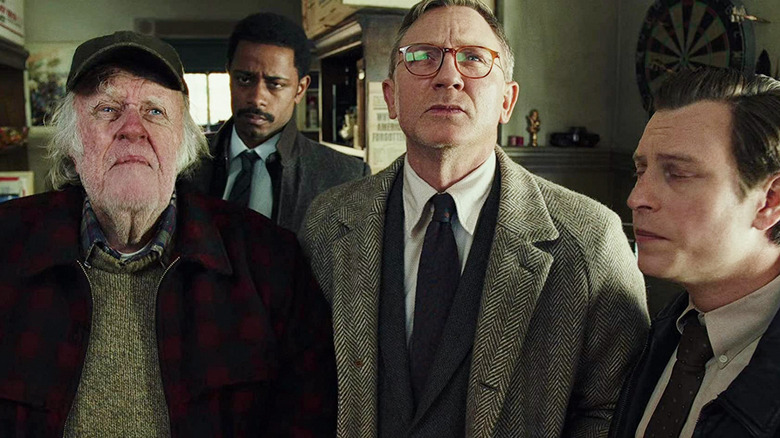Rian Johnson Doesn't Consider Knives Out A 'Deconstruction' Of The Whodunit Genre
I believe it was Sean Parker who once said, "Reviving a genre isn't cool. You know what's cool? Deconstructing a genre."
Yes, we cinephiles probably throw the word "deconstruction" around a little too casually when talking about genre films that surprised us or defied our expectations. (Certain directors are guilty of this too, but that's a whole other story.) There are, however, times when the term is absolutely applicable. Take "Star Wars: The Last Jedi," a movie that everyone in the world appreciates and enjoys discussing in a calm, rational manner. Rian Johnson's sequel to "The Force Awakens" deliberately takes everything filmgoers know about "Star Wars" and throws it out the window. The goal, as /Film's Jacob Hall once wrote, is not to destroy "Star Wars" but to "challenge you and make you question what 'Star Wars' is and what it can be."
Toying with a genre's tropes is nothing new for Johnson. Heck, it's something he's done in every movie he's directed so far, starting with his high school-set noir homage "Brick." Even the filmmaker's "Looper" messes with the conventions of both the sci-fi and action genres in self-aware ways, right down to casting Bruce Willis as a would-be hero who tries to save the day by (what else?) shooting all the bad guys. Johnson's "Knives Out" is similarly cheeky in the way it plays with the customs of the whodunit, with characters spouting lines like, "That was the dumbest car chase of all time."
Is that enough to make "Knives Out" a full-blown deconstruction of the whodunit and murder-mystery genres in general? Johnson doesn't think so and I'm inclined to agree with him, based on his reasoning.
Whodunits have always been meta
The success of 2019's "Knives Out" has ushered in a wave of whodunit projects featuring characters who are keenly aware of the genre's rules and trends, from films like "See How They Run" to the series "Only Murders in the Building." But in a way, that's nothing unusual for the genre, at least in a historical sense. In fact, as Rian Johnson notes in a video where he breaks down his films for GQ, the legendary Agatha Christie was writing novels about people who know they're in a whodunit story long before Johnson came onto the scene:
"I think there was a perception that with 'Knives Out,' it was like a deconstruction of the whodunit or the genre or something. For me, it's very much not the case, because I'm such a huge Agatha Christie fan. That's where all of this comes from, is my love of her books. And if you go back and actually look at what Agatha Christie was doing from the very, very start – if you want to call it deconstructing, she was deconstructing from the very beginning. She was taking the genre apart. Even the meta aspect of kind of characters being aware they're in a detective story, that was there from the very, very start."
Building on this, one could argue a big part of why Christie's 1934 classic "Murder on the Orient Express" was such a hit right out the gate was that its still-shocking ending upended what readers had come to expect after Christie's earlier Hercule Poirot books. Who'd have thought a genre that partially lives or dies on its ability to pull the rug out from under people's feet would be so inherently self-reflexive? I kid, of course, but it's less obvious than you might assume.
An imitation, not a deconstruction
Wind the clock back further and it's the same story. Even Arthur Conan Doyle's "Sherlock Holmes" mystery stories have their fair share of scenes where characters all but lampshade the clichés of the whodunit genre in their dialogue. ("How often have I said to you that when you have eliminated the impossible, whatever remains, however improbable, must be the truth?" as Sherlock famously puts it in Doyle's 1890 novel "The Sign of Four.") Rian Johnson touches on this as well in his GQ video:
"All the characters in Agatha Christie, and even in Sherlock Holmes books, even in Arthur Conan Doyle's work, which vastly predates that, people are aware of the tropes of thriller stories, and detective stories, and are calling them out. So for me, when you take the whodunit and you flip it on your head, you do something narratively completely unexpected, you do something that's self-aware about the genre, you're not subverting what Christie was doing. You're imitating it."
Between "Knives Out" and its critically-acclaimed sequel, "Glass Onion: A Knives Out Mystery," it's fair to say most cinephiles would agree Johnson has done a pretty bang-up job of "imitating" his predecessors in the whodunit genre so far. You can gauge that for yourselves by watching "Glass Onion" when it begins streaming on Netflix on December 23, 2022.


